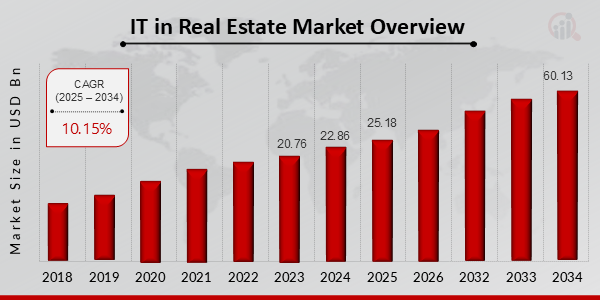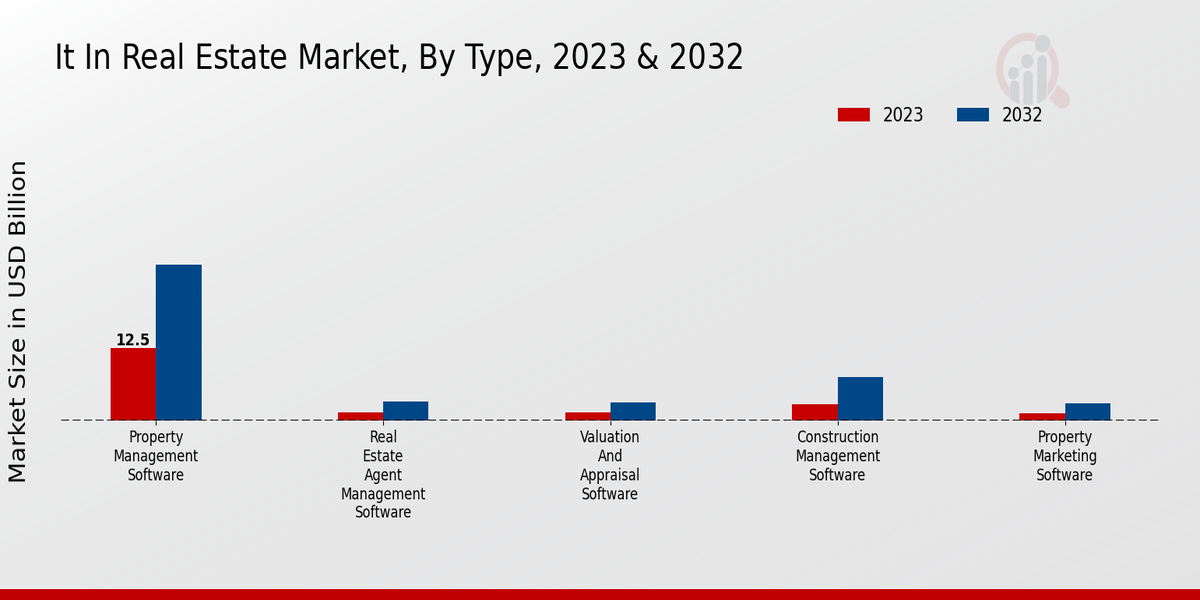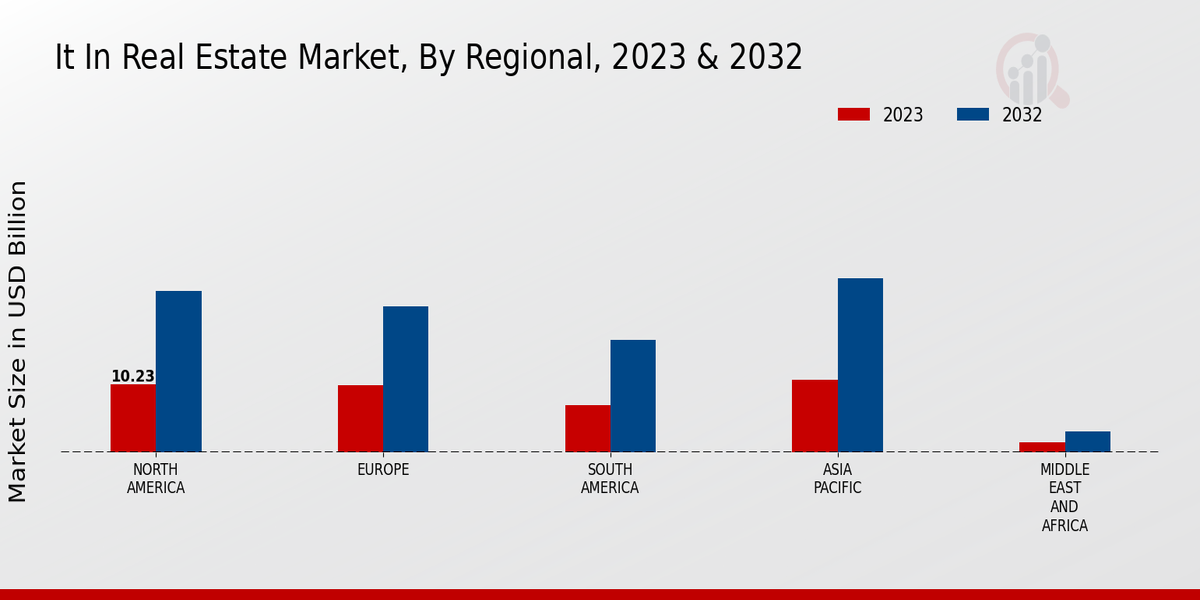IT in Real Estate Market Overview
IT in Real Estate Market is projected to grow from USD 25.18 Billion in 2025 to USD 60.13 Billion by 2034, exhibiting a compound annual growth rate (CAGR) of 10.15% during the forecast period (2025 - 2034). Additionally, the market size for IT in Real Estate Market was valued at USD 22.86 billion in 2024.
Key IT in Real Estate Market Trends Highlighted
The IT in real estate market is rapidly evolving, driven by the adoption of cloud computing, artificial intelligence, and IoT. These technologies are enabling real estate companies to digitize their operations, improve decision-making, and enhance customer experiences. Key market drivers include the need for increased efficiency, improved customer service, and the desire to gain a competitive advantage. Opportunities to be explored include the development of new data-driven applications, the creation of virtual and augmented reality experiences, and the adoption of blockchain technology.
Recent trends include the rise of proptech startups, the integration of smart home technology, and the growing importance of sustainability. To succeed in this competitive market, real estate companies must invest in IT solutions that align with their business goals and provide a clear value proposition. They should focus on partnering with technology providers that have a deep understanding of the real estate industry and a proven track record of success.
Figure 1: IT in Real Estate Market, 2025 - 2034

Source Primary Research, Secondary Research, Market Research Future Database and Analyst Review
IT in Real Estate Market Drivers
Rising Demand for Smart Buildings and Cities
The increasing adoption of smart technologies in buildings and cities is a key driver of growth in the IT in real estate market. Smart buildings and cities utilize sensors, data analytics, and IoT devices to optimize energy consumption, improve security, and enhance occupant comfort. This growing demand for smart technologies is expected to continue in the coming years, as businesses and governments seek to create more efficient and sustainable environments. The integration of It solutions in real estate enables the automation of various processes, leading to increased operational efficiency and cost savings.
Growing Adoption of PropTech Solutions
PropTech solutions are transforming the real estate industry by providing innovative ways to buy, sell, manage, and finance properties. These solutions include online marketplaces, property management platforms, and virtual reality tools. The adoption of PropTech solutions is expected to accelerate in the coming years, as more consumers and businesses recognize the benefits of these technologies. By leveraging It solutions, real estate professionals can gain valuable insights into market trends, customer preferences, and property performance, enabling them to make data-driven decisions and stay ahead of the competition.
Increasing Investment in Infrastructure
Both governments and businesses invest in different infrastructure projects, such as transportation, energy or water systems. All the projects require implementing a big amount of real estate, and that is what determines the growth of IT in the real estate market. With the development of new infrastructure, land is needed to accomplish new projects, so this provides real estate developers with opportunities to develop new property. IT solutions help manage infrastructure development by providing tools for better project planning and control, resource planning and better management, and supplies management. IT solutions also provide stakeholders with better communication and collaboration tools.
IT in Real Estate Market Segment Insights
IT in Real Estate Market Type Insights
The IT in real estate market is classified by type into property management software, real estate agent management software, valuation and appraisal software, construction management software, and property marketing software. In 2023, property management software dominated the segment among other software, holding the highest market share, and by 2032, it is expected to maintain its position. The expansion of this software is associated with the growing utilization of cloud-based property management systems which enable advantageous outcomes, such as instant access to required data, unified management, and improved efficiency.
Real estate agent management software is one of the significant segments across the IT in real estate market. By 2032, it is expected to grow considerably because of the increasing number of real estate agents and brokers. The software, in its turn, allows agents to manage their daily operations, including lead creation, property listing, and interaction with clients. Valuation and appraisal software is an emerging segment. Nowadays, the definitude of a property’s value is crucial for various purposes, such as buying, selling, and refinancing. Meanwhile, these systems are designed to analyses the cost of real estate.
As a third segment, construction management software is a prominent way to control projects. Moreover, it helps construction companies to manage all the stages, including the beginning and the final. It comprises such aspects as project planning, scheduling, budgeting, and teamwork. By 2032, the segment is projected to develop because of the expanding construction sphere. Property marketing software is an initial segment of the market. Nevertheless, by 2032, it is anticipated to grow impressively. This factor is influenced primarily by the growing usage of online marketing among real estate agents and professionals.
By 2032, it will be evaluated at USD 45.0 billion in comparison with USD 18.84 billion in 2023. The key factors, triggering the excessive expansion, are the augmented use of various opportunities provided by technology and IT and the increasing demand for property management, real estate agent management, valuation and appraisal, production management, and advertising software.
Figure 2: IT in Real Estate Market, By Condition, 2023 & 2032
Source Primary Research, Secondary Research, Market Research Future Database and Analyst Review
IT in Real Estate Market Deployment Model Insights
In 2023, the cloud-based deployment model had the largest market share in the IT in real estate market. This can be attributed to the cost advantages, scalability, and operational flexibility of cloud-based solutions. Cloud-based solutions do not require upfront investments in infrastructure or ongoing maintenance costs, and many real estate businesses of all sizes have adopted the technology as a result.
Second, cloud computing is expected to grow across other verticals and the increased emphasis on working from home and remote collaboration post the COVID-19 pandemic will drive the preference for the cloud-based deployment model. The on-premises deployment model had a smaller market share due to a higher prevalence of cloud-based solutions.
Many organizations use on-premises deployment solutions because they can fully control the data and overall IT environment. The demand for digital transformation in the real estate industry and the accompanying transformation in property management, tenant discovery, and facility management are expected to drive the growth of the market over the forecast period.
IT in Real Estate Market End-User Type Insights
The end-user type segment plays a critical role in understanding the adoption trends and preferences of various stakeholders in the IT in real estate market. Among the key end-user types, real estate agents and property managers collectively held a significant market share in 2023. The increasing adoption of technology by these professionals to streamline their operations and enhance customer service has fueled the demand for IT solutions within this segment. Furthermore, developers are projected to witness notable growth over the forecast period as they strive to create smart and sustainable living spaces.
Brokers and investors also contribute to the overall market growth, driven by the need for efficient portfolio management and investment optimization.
IT in Real Estate Market Property Type Insights
The IT in real estate market is segmented based on property type into residential, commercial, and industrial. The residential segment is expected to hold the largest market share in 2023, accounting for around 45% of the revenue. The growth of the residential segment can be attributed to the increasing demand for smart homes and the rising adoption of IoT devices in residential properties. The commercial segment is expected to witness a significant growth rate during the forecast period, owing to the increasing adoption of smart building technologies and the growing demand for energy-efficient solutions in commercial buildings.
The industrial segment is also expected to exhibit a steady growth rate, driven by the increasing adoption of automation and robotics in industrial facilities.
IT in Real Estate Market Regional Insights
North America held the largest share of the IT in real estate market in 2023 and is expected to maintain its dominance throughout the forecast period. The region's strong economic growth, coupled with the increasing adoption of technology in the real estate industry, is driving the market growth. Europe is expected to be the second-largest market, with a significant share. The region's mature real estate market and the growing demand for smart and sustainable buildings are contributing to the market growth. APAC is expected to be the fastest-growing market for IT in real estate, with a CAGR of over 12%.
The region's rapidly growing economies and the increasing investment in infrastructure and real estate development are fueling the market growth.
Figure 3: IT in Real Estate Market, By Regional, 2023 & 2032

Source Primary Research, Secondary Research, Market Research Future Database and Analyst Review
IT in Real Estate Market Key Players and Competitive Insights
There are many major players in the IT in real estate market, and some of them do certain things to outcompete other companies. For instance, in October 2022, MRI Software, a leading provider of real estate management software solutions, launched MRI Perspectives, a new business intelligence platform designed to help real estate organizations make better decisions faster. The platform provides users with a comprehensive view of their real estate portfolio, including trends on different markets, financial data, operational indicators, and other relevant information.
Thus, increased demand for MRI Software products may be attributed to many factors. First, the company is a leading provider of real estate management software solutions. Its products and services are used by many real estate organizations, such as property owners, managers, and investors. Second, the company has a great presence, as it operates in more than 40 countries. Finally, the success of the company may be explained by its commitment to innovation and focus on providing its customers with what they need to become successful in their business.
Another major player in the IT in real estate market is Yardi Systems. Yardi Systems is a provider of real estate investment management and property management software solutions. The company’s products and services are used by many real estate organizations, such as property owners, managers, and investors. Yardi Systems is a company having operations in more than 80 countries. The success of the company may also be explained by its commitment to innovation and focus on providing its customers with what they need.
Key Companies in the IT in Real Estate Market Include
IT Real Estate Market Industry Developments
- Q2 2024: Blackstone to acquire Tricon Residential in $3.5 billion deal Blackstone announced it will acquire Tricon Residential, a Canadian real estate company focused on single-family rental and multifamily properties, for $3.5 billion, expanding its presence in the North American rental housing market.
- Q2 2024: Prologis Completes $3.1 Billion Acquisition of Industrial Properties from Blackstone Prologis finalized the purchase of a portfolio of U.S. industrial properties from Blackstone for $3.1 billion, strengthening its logistics real estate holdings.
- Q2 2024: WeWork emerges from bankruptcy with new leadership and $450mn in funding WeWork exited bankruptcy after securing $450 million in new funding and appointing a new CEO, aiming to stabilize its flexible office space business.
- Q3 2024: Brookfield Asset Management launches $15 billion real estate fund Brookfield Asset Management announced the launch of a $15 billion real estate fund targeting distressed commercial properties in North America and Europe.
- Q3 2024: JLL appoints new CEO to lead global real estate services Jones Lang LaSalle (JLL) named a new global CEO, marking a leadership transition as the company focuses on technology-driven real estate solutions.
- Q2 2024: CBRE acquires UK property management firm Telford Homes CBRE Group completed the acquisition of Telford Homes, a UK-based property management and development company, to expand its residential real estate services.
- Q3 2024: Cushman & Wakefield launches new AI-powered property management platform Cushman & Wakefield introduced an AI-driven platform designed to optimize property management operations and enhance tenant experience.
- Q2 2024: Redfin acquires RentPath for $608 million Redfin completed its acquisition of RentPath, a digital marketing solutions provider for rental properties, to strengthen its rental listings business.
- Q3 2024: Simon Property Group and Amazon announce partnership for logistics hubs Simon Property Group and Amazon entered a partnership to convert select mall properties into logistics hubs, reflecting the shift in retail real estate demand.
- Q2 2024: Starwood Capital raises $2 billion for new real estate opportunities fund Starwood Capital Group raised $2 billion for a new fund focused on opportunistic real estate investments in the U.S. and Europe.
- Q3 2024: AvalonBay Communities opens new 500-unit multifamily development in Austin AvalonBay Communities announced the opening of a new 500-unit multifamily residential development in Austin, Texas, expanding its presence in the Sunbelt region.
- Q2 2024: Zillow launches new AI-powered home search tool Zillow introduced an AI-powered home search tool designed to improve the accuracy and personalization of property searches for buyers and renters.
IT in Real Estate Market Segmentation Insights
IT in Real Estate Market Type Outlook
- Property Management Software
- Real Estate Agent Management Software
- Valuation and Appraisal Software
- Construction Management Software
- Property Marketing Software
IT in Real Estate Market Deployment Model Outlook
IT in Real Estate Market End-User Type Outlook
IT in Real Estate Market Property Type Outlook
IT in Real Estate Market Regional Outlook
IT in Real Estate Market Report Scope
| Report Attribute/Metric |
Details |
| Market Size 2024 |
22.86 (USD Billion) |
| Market Size 2025 |
25.18 (USD Billion) |
| Market Size 2034 |
60.13 (USD Billion) |
| Compound Annual Growth Rate (CAGR) |
10.15% (2025 - 2034) |
| Report Coverage |
Revenue Forecast, Competitive Landscape, Growth Factors, and Trends |
| Base Year |
2024 |
| Market Forecast Period |
2025 - 2034 |
| Historical Data |
2019 - 2023 |
| Market Forecast Units |
USD Billion |
| Key Companies Profiled |
RealPage, Colliers International, ProptechOS, CoStar Group, CBRE, Planon, JLL Technologies, JLL, Savills, Facilio, MRI Software, Altus Group, Yardi Systems, Cushman & Wakefield, CBRE Group |
| Segments Covered |
Type, Deployment Model, End-User Type, Property Type, Region |
| Key Market Opportunities |
1. Data-driven Decision Making 2. Predictive Analytics 3. Digital Twin Technology 4. Contactless Experiences 5. Personalized Customer Experiences |
| Key Market Dynamics |
1. Proptech Adoption 2. Cloud-based Solutions 3. AI and ML Integration |
| Countries Covered |
North America, Europe, APAC, South America, MEA |
Frequently Asked Questions (FAQ):
The IT in real estate market was valued at USD 20.76 billion in 2023.
The IT in real estate market will advance at a CAGR of 10.15% from 2025 to 2034.
The IT in real estate market is anticipated to reach USD 60.13 billion by 2034.
North America will account for the largest share in the IT in real estate market throughout the forecast period.
The property management segment is projected to register the highest growth rate in the market during the forecast period.
Key competitors in the market include IBM, SAP, Oracle, Microsoft, and Yardi Systems, among others.
Factors driving the growth include increasing adoption of digital technologies, rising demand for efficient property management solutions, and growing investments in smart cities.
Challenges faced by the market include data security concerns, lack of standardization, and integration issues.
Key trends include the adoption of cloud-based solutions, the use of artificial intelligence (AI), and the integration of blockchain technology.
Regulatory changes, such as data protection regulations, can impact the adoption and implementation of IT solutions in the real estate industry.

















